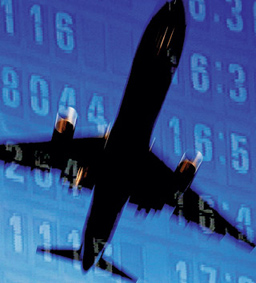
After China's entrysintosWTO, foreign airlines are showing an even stronger interest in the country's civil aviation sector.
"The market is on the verge of a boom due to the country's fast economic growth and its pending accession to the WTO," said Robert Webb, a general council memberof British Airways. The UK flagship carrier has been keeping a close eye on the Chinese market but does not have any immediate plans to increase air routes to the country, Webb said.
British Airways currently offers 18 flights to China every week, including two daily direct flights to Hong Kong and four weekly direct flights to Beijing.
"We have interest in operating flights between London and Shanghai, as well as flights between London and other cities in China's western areas," Webb said.
Eric Chatard, Air France's commercial general manager for China and North Korea,said increased business exchanges between China and other countries after WTO entry would benefit the airline industry.
"Although competition among airlines on the China-Europe route has been severe, most European airlines have increased their flights," Chatard said. "This indicates the potential and vitality of the Chinese market."
Air France has continually expanded its service to China over the past few years. Flights to Beijing have increased from four a week in 1997 to the current dailyservice.
Since its launch of a code-sharing agreement with China Eastern Airlines last April, Air France has been offering five flights weekly from Shanghai to Paris and four from Paris to Shanghai.
The increased service proves the strategic importance that China holds in Air France's development, Chatard said.
John Watkins, vice-president of the US-based Northwest Airlines, said China is one of the most important civil aviation markets in the world and many airlines inthe United States have plans to fly to China.
Insiders said that US Airlines services to China are expected to increase to 54 flights a week in the next few months.
Facing fierce foreign competition, the Civil Aviation Administration of China (CAAC) has pushed domestic airlines to consolidate.
Experts said mergers could solve the problems of competition at a lower level, which have puzzled the domestic civil aviation industry for years, as well as helpChinese airlines to increase competitiveness after China enters the WTO, they said.
The wraps were removed from China's aviation reform plans on February 6. Air China, China Eastern and China Southern will each take over smaller airlines and shape three newsgroupscompanies, CAAC director Liu Jianfeng said at the annual aviation meeting.
Beijing-based Air China will be combined with China Southwest Airlines and ChinaAviation Corporation. Shanghai-based China Eastern Airlines will be merged with China Northwest Airlines and Yunnan Airlines. Guangzhou-based China South Airlines will take over China Northern Airlines and Xinjiang Airlines.Each of the three groups will have assets of 50 billion yuan (US billion) and a fleet of 150 or so aircraft.
The three aviation groups will sever economic relations with CAAC after the reform. The CAAC will continue to regulate the industry through legal and economic means, but will no longer play an administrative role. China will deepen managementreforms at the country's 129 airports and abolish 24 local aviation administrations, leaving just seven: North China, East China, Central China, Northwest China,Southwest China, Northeast China and Urumqi administrations.
CAAC plans to restrict the air routes involving the cities of Beijing, Shanghai and Guangzhou. Beginning this summer, airlines that do not have headquarters in any of the three cities will no longer be able to fly the three lucrative air routes. From the beginning of next winter, flights transferring through the three cities will be ended. These measures are expected to help stop the disorderly competition on the routes among the three cities, and establish a clear and rational aviation network across the country. CAAC will encourage local airlines to develop more short-distance flights between provincial capitals and smaller cities.
CAAC also plans to limit the purchase of new airplanes in the near future. Airlines that have ordered redundant aircraft will be encouraged to postpone delivery dates or to rent the planes to third parties. If airlines cannot provide the CAACwith precise forecasts of how these new planes will contribute to profitability,the purchase applications will unlikely be approved. China will need more planesin the future to fill the demands of the expanding aviation market, but it will be far less than some plane manufacturers had predicted.
The industry as a whole managed to take in 690 million yuan (US million) in profits in 2001. Debt-plagued airlines including Air China, China Southwest Airlines, China Northern Airlines and Xinhua Airlines all turned a slight profit in 2001, while some profitable airlines like China Southern Airlines and China Eastern Airlines further improved their performance.
As part of its merger plan, China's largest carrier China Southern Airlines plans to buy five planes and other assets from its parent for 1.1 billion yuan (US million).
The Hong Kong-listed China Southern also will issue and list yuan-dominated A-shares on the mainland to buy aircraft or reduce debts. Their acquisition plans include five Boeing 737-300 jets, spare parts and 42 special purpose vehicles for ground support.
Domestic listing should give the company access to another financial channel as foreign shares cannot exceed 35 per cent in Chinese airlines. The foreign presence in China Southern has reached 34.8 per cent.
China Eastern Airlines president Ye Yigan said preparations are underway for China Northwest Airlines and Yunnan Airlines to merge. The new company will buy 30 to 50 Airbuses within three years. China Eastern will become one of the country's three biggest aviation groups approved by the State Council. Under the plan, the other six airlines affiliated with the General Administration of Civil Aviation of China will be reformedsintostwo groups, with Air China joining China Aviation Corp and China Southwest Airlines and China Southern Airlines uniting with China Northern Airlines and Xinjiang Airlines. After the three groups are set up, they will be freed from the administration of the CAAC.
| ![]() 本网站由北京信息港提供网络支持
本网站由北京信息港提供网络支持
